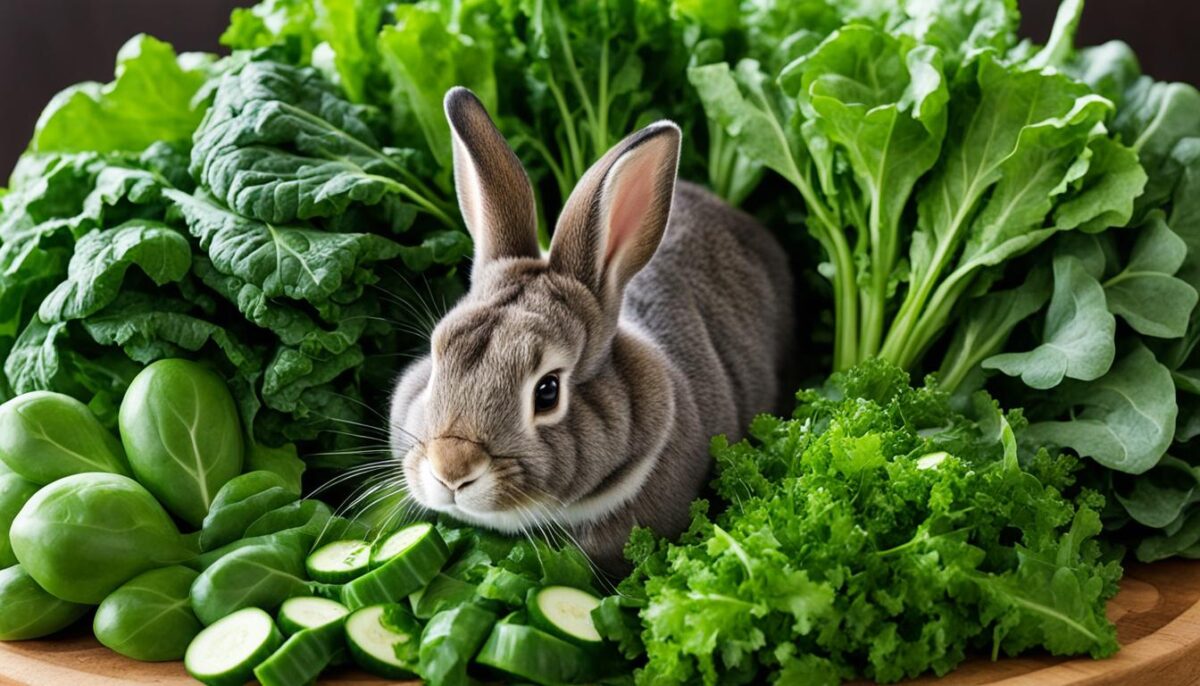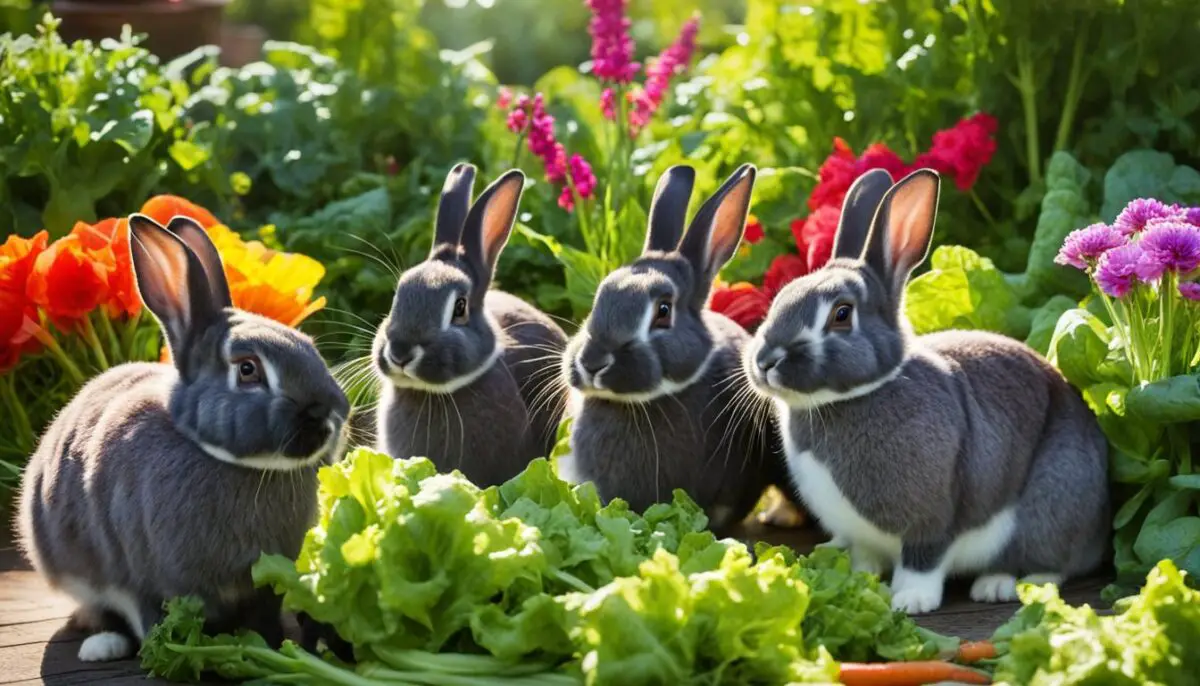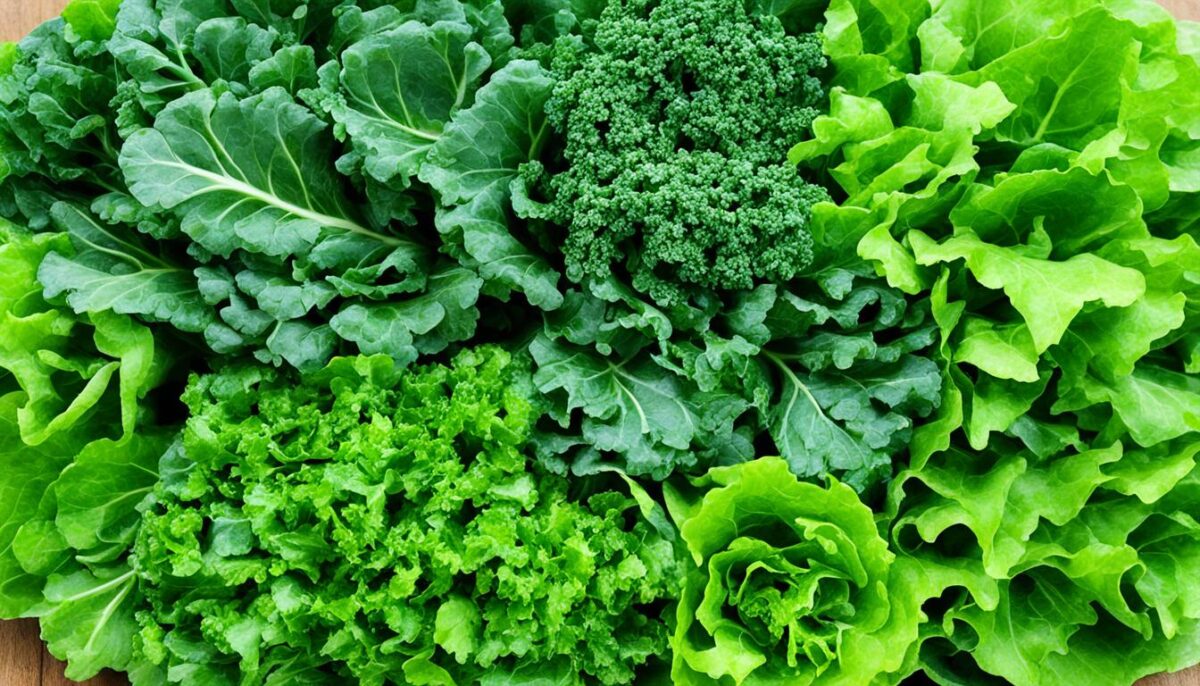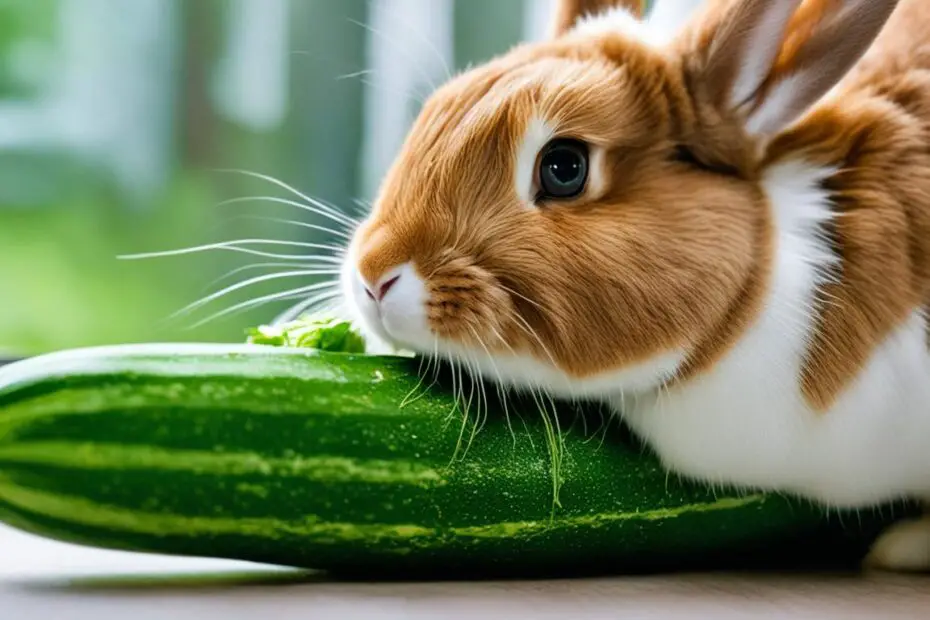Rabbits are herbivores and have specific dietary requirements for optimal health. While hay is an essential part of their diet, providing fiber and promoting dental health, fresh vegetables also play a crucial role in providing essential nutrients and variety. One popular question among rabbit owners is whether rabbits can eat zucchini, and the answer is yes!
Zucchini is safe and can be a tasty addition to a rabbit’s diet. It is rich in fiber, which aids in digestion, and contains vitamins A, C, and K. Additionally, zucchini provides soluble fiber and trace minerals that contribute to a well-rounded diet.
Key Takeaways:
- Rabbits can eat zucchini and benefit from its fiber and nutrient content.
- Introduce zucchini gradually to avoid digestive issues.
- Offer a variety of vegetables to ensure a well-rounded diet.
- Consult with a veterinarian to determine the best diet for your rabbit.
- Remember to wash all vegetables before feeding them to your rabbit.
The Importance of Leafy Greens and Vegetables in a Rabbit’s Diet
When it comes to a rabbit’s diet, leafy greens and vegetables play a crucial role in providing essential nutrients and maintaining overall health. These greens and veggies are packed with vitamins, minerals, antioxidants, and hydration that are vital for a rabbit’s well-being. They offer a variety of benefits that contribute to a balanced diet and promote optimal nutrition.
Approximately 8-10% of a rabbit’s diet should consist of leafy greens and vegetables. Dark leafy greens should make up the majority of this portion. These greens include options such as romaine lettuce, red or green leaf lettuce, spinach, kale, watercress, parsley, dandelion greens, and mint. They are rich in vitamins and minerals, providing vital nutrients that keep your rabbit healthy and thriving.
Along with dark leafy greens, a variety of other vegetables can be included in a rabbit’s diet. Safe options include bell peppers, broccoli, celery, cucumber, and zucchini. These vegetables provide additional nutrients and contribute to a well-rounded diet for your furry friend.
It is important to note that fruits should be offered infrequently and in small amounts due to their higher sugar content. Rabbits are designed to eat primarily leafy greens and vegetables, so it’s crucial to prioritize these options for their nutritional needs.
The Benefits of Leafy Greens and Vegetables for Rabbits
Leafy greens and vegetables offer a range of benefits that support a rabbit’s health and nutrition.
- Nutrient-rich: Leafy greens and vegetables are packed with vitamins A, B, C, and K, as well as essential nutrients like soluble fiber and trace minerals.
- Hydration: These greens and veggies contain a high water content, helping to keep your rabbit hydrated and supporting overall digestion.
- Antioxidants: They are a rich source of antioxidants, which help protect against oxidative stress and support the immune system.
Introducing a cup of dark leafy greens per 2 pounds of your rabbit’s body weight daily can provide them with the necessary nutrition and hydration they need. This tailored approach ensures that your rabbit’s diet is balanced and meets their individual needs.
Consulting with a veterinarian is essential for establishing a proper diet plan for your rabbit. They can provide personalized recommendations based on your rabbit’s specific requirements and health status. Remember to introduce new foods gradually to prevent any digestive upset and monitor your rabbit’s reaction to different greens and veggies.

By incorporating a variety of leafy greens and vegetables into your rabbit’s diet, you can provide them with the necessary nutrients for a healthy and balanced life. Remember to offer a diverse selection of greens and vegetables, rotate them for variety, and consult with a veterinarian for specific dietary requirements. Your rabbit will thank you for it with their vibrant energy and overall well-being!
The Benefits of Fresh Greens and Veggies for Rabbits
Rabbits can greatly benefit from including fresh greens and veggies in their diet. These nutritious foods provide a variety of essential vitamins, minerals, fiber, and phytonutrients that contribute to their overall health and well-being. Let’s explore some of the specific benefits:
Nutritional Value
Greens and veggies offer a range of important nutrients that are crucial for a rabbit’s optimal health. They are packed with vitamins A, B, C, and K, which support various bodily functions, including vision, immune system function, and blood clotting. These vitamins play a vital role in maintaining a rabbit’s overall well-being. In addition, these foods provide soluble fiber, as well as trace minerals such as iron, manganese, copper, and zinc, which are necessary for maintaining proper bodily functions and preventing deficiencies.
Phytonutrients and Their Benefits
Phytonutrients are natural compounds found in plants and can provide numerous health benefits to rabbits. These compounds, such as flavonoids and carotenoids, have antioxidant properties that help protect cells from damage caused by harmful free radicals. They also support the immune system, reduce the risk of age-related issues, and promote overall longevity.
Adding a variety of fresh greens and veggies to a rabbit’s diet can contribute to their overall health and well-being.
Rabbits can enjoy the following benefits from consuming phytonutrient-rich greens and veggies:
- Enhanced immune system function
- Reduced inflammation
- Improved cardiovascular health
- Detoxification support
Fiber for Digestive Health
Fiber is a crucial component of a rabbit’s diet. Greens and veggies provide rabbits with ample amounts of dietary fiber, which is essential for maintaining proper digestion and preventing gastrointestinal issues. Fiber helps regulate the movement of food through the digestive tract, promotes healthy gut flora, and prevents the formation of hairballs.
By incorporating fresh greens and veggies into a rabbit’s diet, you can ensure they receive the necessary nutrients, support their immune system, and promote healthy digestion.
| Benefit | Description |
|---|---|
| Vitamins | Greens and veggies are rich in vitamins A, B, C, and K, which support various bodily functions and contribute to overall well-being. |
| Phytonutrients | Phytonutrients found in these foods offer antioxidant and immune system support, as well as protection against age-related issues. |
| Fiber | These foods provide essential dietary fiber, promoting healthy digestion and preventing gastrointestinal issues. |

Best Greens and Veggies for Rabbits
When it comes to providing a healthy and balanced diet for your rabbit, it’s important to choose the right greens and vegetables. While there are many options available, it’s crucial to prioritize the safety of the food you offer to your furry friend. Here is a list of rabbit-safe greens and vegetables:
Safe Greens for Rabbits:
- Romaine lettuce
- Red or green leaf lettuce
- Spinach
- Kale
- Watercress
- Parsley
- Dandelion greens
- Mint
Safe Vegetables for Rabbits:
- Bell peppers
- Broccoli
- Celery
- Cucumber
- Zucchini
It’s important to note that while these greens and vegetables are considered safe for rabbits, there are also some foods that should be avoided. Iceberg lettuce, rhubarb, and raw onions, leeks, or garlic can potentially cause digestive issues for rabbits and should be kept off their menu.
“Offer a variety of safe greens and vegetables to ensure your rabbit receives a diverse and nutritious diet.”
| Type of Green/Vegetable | Benefits |
|---|---|
| Romaine lettuce | Good source of vitamins A, C, and K; helps support bone health |
| Spinach | High in iron and beta-carotene; supports eye health and immune system |
| Bell peppers | Rich in vitamin C; provides antioxidants for overall well-being |
| Zucchini | High in fiber and water content; aids in digestion and hydration |
When introducing new foods to your rabbit’s diet, it’s important to do so gradually and in small quantities. This allows their digestive system to adjust and helps prevent gastrointestinal distress. Additionally, choosing organic produce whenever possible can help reduce the risk of exposure to pesticides. Remember to always wash all produce thoroughly before offering it to your rabbit.

By providing a range of safe greens and vegetables, you can ensure that your rabbit’s diet is not only nutritious but also enjoyable. Remember to consult with a veterinarian for personalized advice and guidance on feeding charts and specific dietary options for your furry companion.
Guidelines for Feeding Greens and Veggies to Rabbits
Feeding your rabbit a balanced diet that includes a variety of greens and veggies is crucial for their overall health and well-being. To ensure you’re providing the right amount and types of foods, here are some guidelines to follow:
1. Portion Sizes and Frequency
A general rule of thumb is to feed rabbits about 1 tablespoon of non-leafy green veggies per 2 pounds of body weight per day. This can be divided into multiple feedings throughout the day or offered all at once.
2. Variety is Key
It is recommended to provide 3-5 different types of greens and veggies daily, rotating them for variety. This not only ensures that your rabbit receives a wide range of nutrients but also keeps mealtime interesting and enjoyable for them.
3. Introduce New Foods Gradually
When introducing new greens or veggies to your rabbit’s diet, it’s important to do so gradually. Start by offering a small amount and monitor their reaction. If there are no digestive issues or changes in behavior, you can gradually increase the portion size.
4. Monitor Digestive Health
Keep a close eye on your rabbit’s attitude, appetite, and stool production when introducing new foods. Any signs of gastrointestinal distress, such as diarrhea or reduced appetite, should be addressed promptly. If you notice any concerning changes, consult your veterinarian.
5. Consider Individual Health Factors
Some greens and veggies may be higher in calcium or oxalates, which can pose problems for rabbits with certain medical conditions. If your rabbit has specific health issues, consult with your veterinarian to determine if any foods should be fed sparingly or avoided altogether.
6. Stick to a Feeding Schedule
Establishing a consistent feeding schedule for your rabbit can help maintain their digestive health and prevent overfeeding. Aim to provide fresh greens and veggies at the same time each day, in addition to their regular hay and pellets.
| Vegetables | Serving Size per 2 lbs of Body Weight |
|---|---|
| Romaine Lettuce | 1 cup |
| Spinach | 1/2 cup |
| Kale | 1/2 cup |
| Watercress | 1/4 cup |
| Parsley | 1/4 cup |
| Dandelion greens | 1/4 cup |
| Mint | 1/4 cup |
Conclusion
In conclusion, zucchini is a safe and healthy vegetable that can be included in a rabbit’s balanced diet. Along with other greens and veggies, zucchini provides important nutrients and enrichment for rabbits. It is essential to introduce new foods slowly and monitor for any digestive issues to ensure the well-being of your pet.
Following feeding guidelines, such as offering portion sizes based on body weight and providing a variety of greens and veggies, can help rabbits thrive. Consulting with a veterinarian is always recommended to determine the best diet for an individual rabbit and to address any specific considerations or health concerns.
By offering a diverse and nutritious diet, rabbits can enjoy their mealtime while receiving the necessary vitamins, minerals, and fiber needed for their overall health and well-being. Remember to prioritize your rabbit’s diet and provide them with the best possible care to ensure a happy and healthy life.
FAQ
Do rabbits eat zucchini?
Yes, rabbits can eat zucchini. It is safe and nutritious for them. However, it should be given in moderation and introduced gradually to avoid gastrointestinal distress.
What other vegetables can rabbits eat?
In addition to zucchini, rabbits can also eat lettuce, spinach, kale, watercress, broccoli, bell peppers, and cabbage. These vegetables provide important nutrients and variety in a rabbit’s diet.
How much vegetables should I feed my rabbit?
Approximately 8-10% of a rabbit’s diet should consist of greens and veggies. For dark leafy greens, it is recommended to offer 1 cup per 2 pounds of a rabbit’s body weight daily.
Are there any vegetables that rabbits should avoid?
Yes, rabbits should avoid vegetables like iceberg lettuce, rhubarb, and raw onions, leeks, or garlic. These can be harmful to their health. It is important to provide safe greens and veggies to rabbits.
How should I introduce new vegetables to my rabbit’s diet?
New foods should be introduced slowly and in small quantities to avoid digestive issues. It is also important to monitor for any changes in attitude, appetite, or stool production. Consult with a veterinarian for personalized recommendations.
Can I feed zucchini to rabbits every day?
While zucchini is safe for rabbits, it should be given in moderation. It is best to provide a variety of greens and veggies to ensure a balanced and nutritious diet for rabbits.


